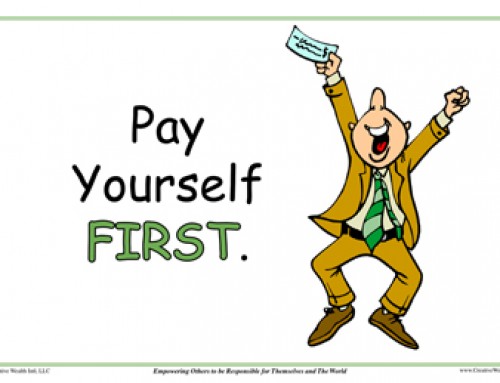Keeping Track of Your Stuff
If you don’t keep track of your things, they tend to get misplaced.
Keys are like that. Sunglasses are like that. Time is like that and money is seriously like that. Heck, kids can be that way sometimes, too!
A large majority of adults, if they are honest, don’t have a clue how much money they have, how much money they spend, how much their investments are worth (if they have any) or what the return on their investments is.
They also can’t tell you how much their car insurance costs, how much they spend every month on food or gas or how much they spend on their children monthly.
All of this ‘not having a clue’ generally leads to people’s financial lives being a bit of a mess (or worse).
This begs the question…if the amount of money we have has so much to do with how and what we get to experience in this one short life-time of ours, why the heck don’t we know:
- How to make it (as opposed to earning it)?
- How to save it?
- How to spent it wisely (hello, needs vs. wants)?
- How to invest it (make it grow into more money)?
- How to envision ourselves older and therefore, plan for that older person?
The short answer is that most of us aren’t taught this stuff as children and even those who are sometimes struggle with actually doing what they were taught.
But let’s leave this pondering until another time and go back to the principle of telling your money where to go.
Have you ever thought about what would happen as you drove around a curvy road and took your hands off the wheel? Ouch…most of us have had that thought at least once in our lives and most of us shiver at the answer…we’d go barreling off the road to who knows what end.
I know it’s kind of a gruesome analogy but let’s compare it to not managing your money.
So, what does it actually mean to ‘tell your money where to go’?
Great question!
It means that you have a plan and you stick to the plan.
If means that you have at least some short terms goals and maybe even a few long-term ones.
It means that you’ve actually sat down a few times and put pen to paper, maybe even mouse to Excel sheet (haha) to look at your income and your outcome…I mean expenses…so you know how much money you can put away and invest every month to grow a nest egg and/or create a regular cash flow situation for yourself for when you just don’t want to work for money anymore.
Some people call this retirement but for many people, the word ‘retirement’ has an age associated with it and that age tends to be older.
Personally, I prefer the idea of financial freedom where the income from your investments exceeds the expenses of your chosen lifestyle. That income could come from any number of sources:
- Classic retirement account such as a 401(K) or an IRA.
- Retirement income from working at a company for decades
- Rental income from real estate investments
- Regular profits that come from some type of business
- Dividend and interest payments from investments in different areas of the stock market.
- Royalties and such from creative works such as songs, movies, books, artwork.
- And any number of other creative ways you could come up with to produce a regular stream of dollars to support your life.
The first step in learning how to tell your money where to go involves setting goals that you’d classify as being a priority to you. This is because if things are NOT a priority, you simply won’t do them or do them for very long.
Then, you need to determine how you want to go approach those goals and, as listed above, there are lots of ways to achieve the same goal.
The easiest way to start looking at this is to do the following:
- Determine when you want to reach the goal…the goal can be a way of life or a quantity of money.
- Figure out roughly how much money you’re going to need to accomplish this goal.
- Divide the amount of money into the number of months that you have to achieve the goal.
- Start learning the best ways to make your dreams into reality for yourself*. I always start my coaching clients on the adventure of uncovering the money beliefs that may be holding them back. You can think this is an airy-fairy, foo-foo step but I promise you it’s a critical one. Our subconscious is the one driving the bus and if we don’t get a handle on what’s driving our subconscious, all the planning in the world will probably not help you reach your goals.
- Design a budget that makes you feel good about your goals and one you can live with and modify as you need. Many people feel that living within the parameters of a budget is too confining but I like to point out that living on an extremely low monthly income at 75 years of age is probably even more confining!
- Start using your new budget as soon as possible.
- Notice how quickly you start to adapt to the goals, seeing them as getting closer, noticing that living within your budget plans makes you feel good about what you’re doing with your life.
- Then, after you’ve on your way, put an alarm in your calendar for every 6 months to review your budget and make changes as necessary.
I promise you this…if you do the work to tell your money where to go, you’ll be much happier knowing where it went (especially knowing it’s going somewhere to help you in your future) than just letting life take it away because you don’t have a plan.
So…do you know where YOUR money is going?
Good luck and let me know how it goes.
* Just having a goal and doing the preliminary leg work like creating budgets and such isn’t enough to reach your goals. There is a LOT of research out there that shows how our financial thoughts, beliefs and attitudes have everything to do with reaching those goals. To learn more, pick up any (or all) of the following books on the mental and emotional aspects of money and wealth creation:
- Secrets of the Millionaire Mind by T.Harv Eker
- The Soul of Money by Lynn Twist
- The Problem with Money? By Jane Honeck
- Millionaire Next Door by Thomas J. Stanley
- Millionaire Woman Next Door by Thomas J. Stanley



Leave A Comment